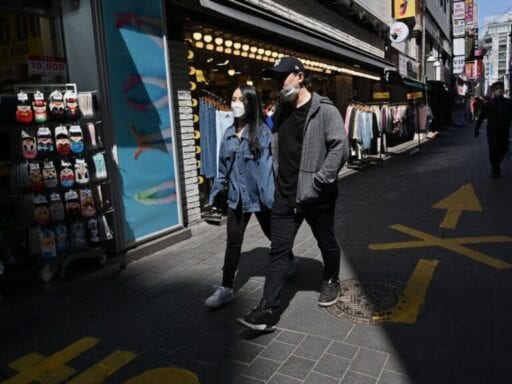After May 6, facilities like parks, museums, and schools are set to gradually reopen.
South Korea will take new steps to relax social distancing on May 6, in yet another sign that the country that once had one of the worst outbreaks of coronavirus outside China has managed to bring its transmission under control.
Prime Minister Chung Sye-kyun said in a televised meeting Sunday that the government “will allow businesses to resume at facilities in phases that had remained closed up until now, and also allow gatherings and events to take place assuming they follow disinfection guidelines.”
Under what Chung referred to as the “everyday life quarantine scheme,” facilities like schools, parks, museums, and libraries are expected to reopen in phases, according to Reuters and the Korea Herald. The government’s guidelines will continue to recommend that people stay home for three to four days if they feel sick, wash their hands frequently, and keep an arms-length distance from other people in public, however.
And professional baseball and soccer matches are expected to start up again this week, although without in-person audiences.
The rate of new infections in the country has slowed dramatically in recent weeks. In late February, South Korea was seeing more than 900 new cases of coronavirus a day. By mid-April, that number hit as low as eight new reported cases in a day, and in the past week there have been around 10 new reported cases a day. Overall the country has reported around 10,800 cases and 250 deaths.
The reduction of new cases in South Korea is a striking achievement for a country that earlier this year had the largest number of confirmed cases in Asia outside China. On February 20, confirmed infections skyrocketed exponentially after a parishioner of a megachurch in the southern city of Daegu infected other congregants during services, but the government’s aggressive testing and contact-tracing regime seems to have played a significant role in counteracting that rapid spike in cases quickly.
The government said it would begin to relax quarantine rules if new reported cases stayed below 50 a day — a condition that has been met for the past 25 days, according to the Korea Herald.
South Korea has been approaching coronavirus differently than many countries
South Korea’s rapid reduction of its new infection rate has caught the eye of governments and public health officials around the world.
Experts say there are a number of measures it’s taken to achieve its results, including building a highly organized and massive testing capacity, and the government’s institution of tracing and isolation measures for people who have been in contact with the infected.
Notably, South Korea has generally avoided the wide-scale shutdowns that China and the US have pursued, according to Business Insider. It has shut down schools and imposed a curfew in some cities, but the government has sought primarily to isolate groups of people who are suspected to have been exposed — and it has done so in a highly targeted fashion.
The New York Times’ Max Fisher and Choe Sang-Hun wrote a thorough explainer in late March about what makes the South Korean model effective. Among other things, they highlight that the government organized mass production of coronavirus test kits earlier than many other hard-hit countries, which meant in late March the country had a per-capita test rate “more than 40 times that of the United States.”
They also point to an astonishingly extensive surveillance and contact-tracing infrastructure:
South Koreans’ cellphones vibrate with emergency alerts whenever new cases are discovered in their districts. Websites and smartphone apps detail hour-by-hour, sometimes minute-by-minute, timelines of infected people’s travel — which buses they took, when and where they got on and off, even whether they were wearing masks.
People who believe they may have crossed paths with a patient are urged to report to testing centers.
South Koreans have broadly accepted the loss of privacy as a necessary trade-off. People ordered into self-quarantine must download another app, which alerts officials if a patient ventures out of isolation. Fines for violations can reach $2,500.
The government has also taken measures to try to comfort people in the chaos by doing things like sending comfort packages with food and cleaning supplies to people who are under quarantine.
Approval of the government’s response to the pandemic was so widespread that the country saw its largest turnout in nearly three decades during national elections held last month, and the ruling party won reelection by a landslide. Notably, there was no uptick in infections in the election’s aftermath, likely thanks to strict social distancing, testing, and disinfecting measures put in place at polling sites.
South Korea’s management of the spread of the virus does not mean it’s out of the woods. Places like Hong Kong and Singapore have seen resurgences of cases, in part due to people entering the country from abroad. But South Korea does seem to have some effective tools — and a plan — in place to manage the spread for now.
Support Vox’s explanatory journalism
Every day at Vox, we aim to answer your most important questions and provide you, and our audience around the world, with information that has the power to save lives. Our mission has never been more vital than it is in this moment: to empower you through understanding. Vox’s work is reaching more people than ever, but our distinctive brand of explanatory journalism takes resources — particularly during a pandemic and an economic downturn. Your financial contribution will not constitute a donation, but it will enable our staff to continue to offer free articles, videos, and podcasts at the quality and volume that this moment requires. Please consider making a contribution to Vox today.
Author: Zeeshan Aleem
Read More



